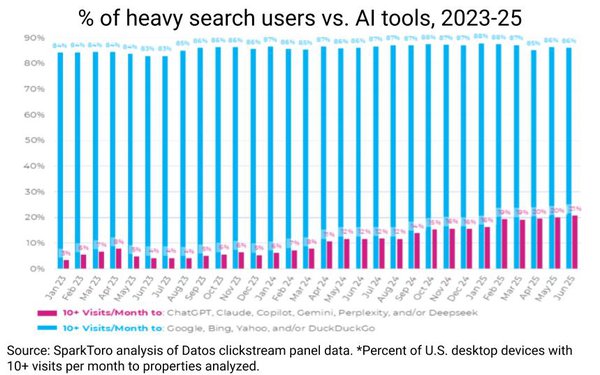
AI continues to see massive growth in use, but it may be
surprising that traditional search continues to keep pace, with 95% of Americans using search engines each month. Some 86% are considered heavy users, which means they use the engines ten times or
more each month.
More than 20% of Americans are considered heavy users of AI tools, and nearly 40% use at least one AI tool at least once each month.
SparkToro, an audience
intelligence platform, combined its data with clickstream data and panelist visits.
One group came from traditional U.S. engines Google, Bing, Yahoo, and DuckDuckGo, and the other from AI tool
providers ChatGPT, Claude, Copilot, Gemini, Perplexity, and DeepSeek.
The data shows that traditional search, even for heavy adopters of AI, remains important. But the more data gathered by
SparkToro founder Rand Fishkin, the more he becomes convinced that the " 'AI vs. Search’ narrative is largely made up by media and influencers seeking attention, rather than an accurate
reflection of reality.”
advertisement
advertisement
The data does not say why adoption does or does not happen. It only reports on the numbers.
Fishkin suggests AI adoption is slowing because the industry
is reaching a saturation point among the group most likely to use it who need AI for their jobs or education.
Based on that knowledge, growth and adoption rates continue to decline based on
the combined set of AI tools SparkToro analyzed.
Those tools — ChatGPT, Claude, CoPilot, Gemini, Perplexity and Deepseek — have not seen a month of growth of more than
1.1X since September of 2024.
That’s not to say that AI tools are not continuing to gain users, but the data shows the growth rate is slowing.
Fishkin says the industry could
reach a plateau in the next 12 to 24 months unless the AI players can persuade a wider swath of Americans to use their engines.
The engines experiences what Fishkin called “a summer
slump,” when school lets out and people step away from their computers and phones.
The data does not include mobile apps and mobile browser use. OpenAI recently published numbers around
their token-use, showing a quick drop the day the U.S. summer break began.